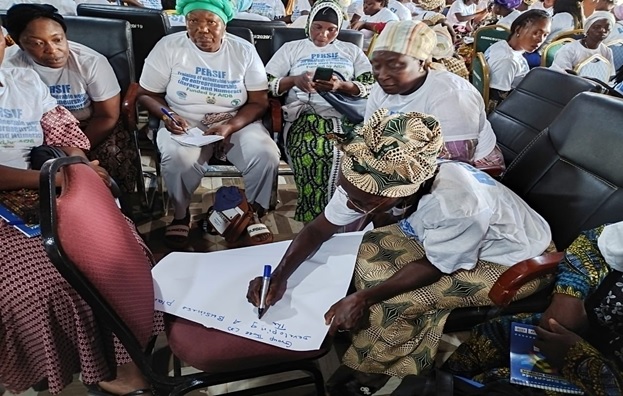The Ministry of Social Welfare through the Post Ebola Recovery Social Investment Fund (PERSIF) Project is currently empowering approximately 5500 Sierra Leoneans mainly Female Cross Border Traders, EVD Survivors, Person with Disability, and Women and Girls in entrepreneurial, literacy and numeracy skills. The training commenced on Monday, 10th July, 2023 at the Kenema District Council in Kenema District, alongside other towns in the same district including Blama, Panguma and Wima. The training was continued in Kailahun District in places like Bewela, Segbema, Daru, Gbundubu and Bumaru, and expected to end in Kono District in the townships of Koidu, YaduMafindor, and Sandor.
The process has been facilitated by the Agency for Integrated Development (AID) Sierra Leone.
Monitoring and Evaluation Specialist of the PERSIF Project, Abdul Karim Kanu, who led a monitoring mission organized by the PERSIF Project to the respective training clusters to fully assess the satisfaction and appreciation of the beneficiaries said a similar training has been given to 5500 Female Cross Border Traders, EVD Survivors, Person with Disability, and Women and Girls in the Northern and Northwestern Provinces.
He said that 3500 of the trainees are Existing Government Cash Transfer Beneficiaries from the NACSA Social Safety Net who have not fully benefitted from a formal training to handle their businesses. He informed that the PERSIF Project is an initiative under the Ministry of Social Welfare with funds from the African Development Bank (ADB) to contribute to the availability of selected basic social services, restoration of livelihood and economic opportunities in post ebola communities, adding that the project seeks to foster economic and social inclusion and gender equality by strengthening the financial foundation of the poor, and women in particular, to carry out economic activities, while reinforcing their autonomy and resilience to shocks.
Maada Koroma of AID-SL who is the Coordinator of the three week training said the participants were gathered right across the chiefdoms in the three districts. According to Mr. Koroma, the training was organized in clusters with each training platform represent a cluster. He added that the trainees were trained how to develop a business plan, keep financial records, how to keep a balance between profit and loss, and what ultimately needs to be saved. He went to state that one of AID-SL’s key priorities is to ensure that the beneficiaries are empowered with numeracy and literacy skills since a cross-section of them are illiterate. “Most of the women that are to benefit from the cash transfer scheme are illiterate women. We want to ensure that they practice and have the skills so that they will be in a position to develop their business from one level to another and even be in the capacity to provide and issue out receipts were necessary.” He disclosed how the facilitators have been encouraging the trainees to put the training into practice so that the workshop would not look like any of the usual trainings where everything ends immediately afterwards.
Mariama Gbao, Gender Officer of Aid-SL said women lost their businesses as a result of the ebola outbreak, followed by the COVID, which left a lot of them homeless and disadvantaged. She pointed out the role of women in business has been very key hence the effort made by the African Development Bank to train them in doing business and make them beneficiaries of the cash transfer scheme through the Ministry of Social Welfare is a contribution to national development.
Hawa Niallo, a beneficiary of the training said she learned a lot about business development and savings. She disclosed that she had been doing business but found out through the training that when one buys a business, one should consider the income and expenditure. This according to Madam Niallo will help the business person know what she committed to the business and the profit that came in. She noted that she also learned about the importance of savings in business, adding that some of them have not been saving due to family commitment and other distractions. The training, she added has changed her perception in life. She thanked the ADB and AD-SL for strengthening her business skills and promised to cautiously utilize the money she would be receiving.
Debora Koroma, another beneficiary of the training said she learned a lot about business development and savings. She stated that she was fully trained how to save in doing business, and that saving should not be limited only to huge profit making. Debora maintained to have learned that a business woman should not put all her personal problems in her business if she wants to progress as it is necessary to minimize one’s extra expenditure to save better. She thanked the ADB for funding the training. The benefit from the Cash Transfer Scheme she said would help her to be independent and not being disadvantaged society.


